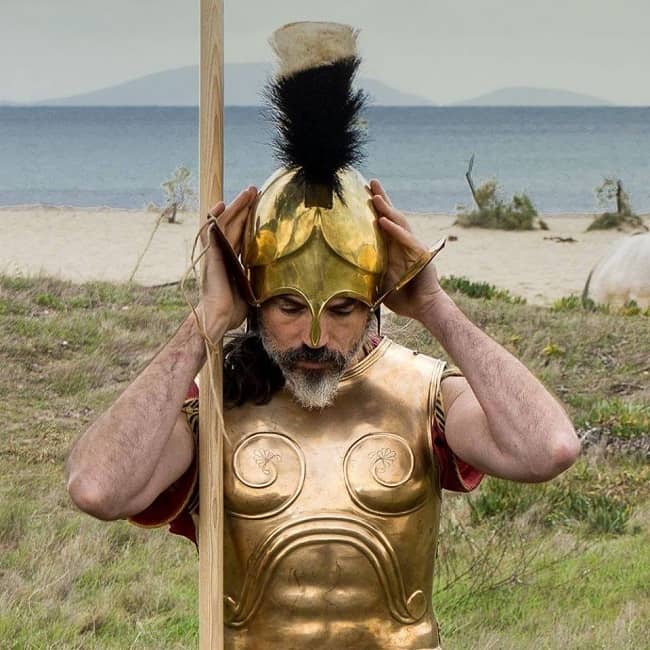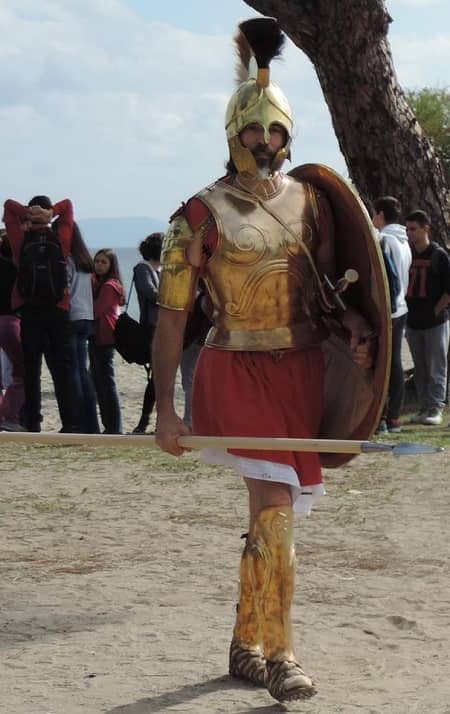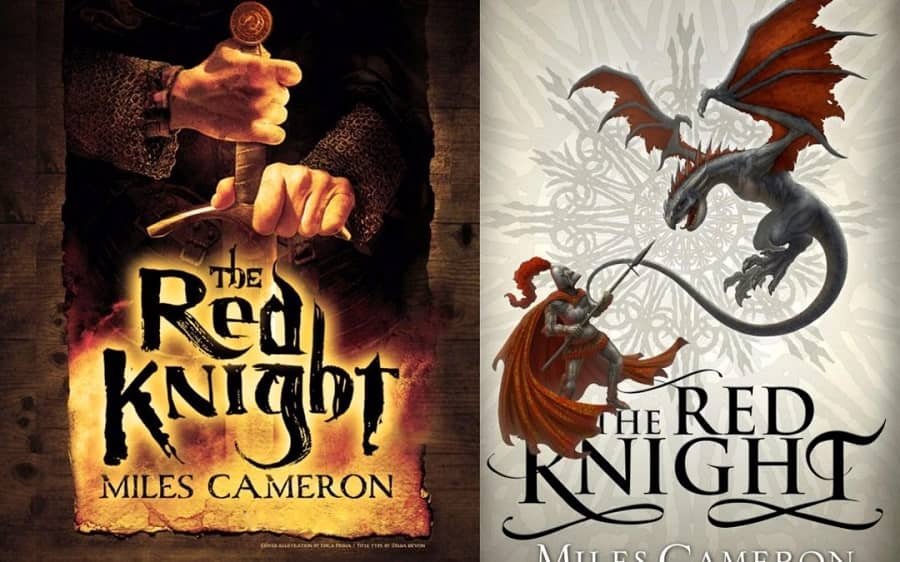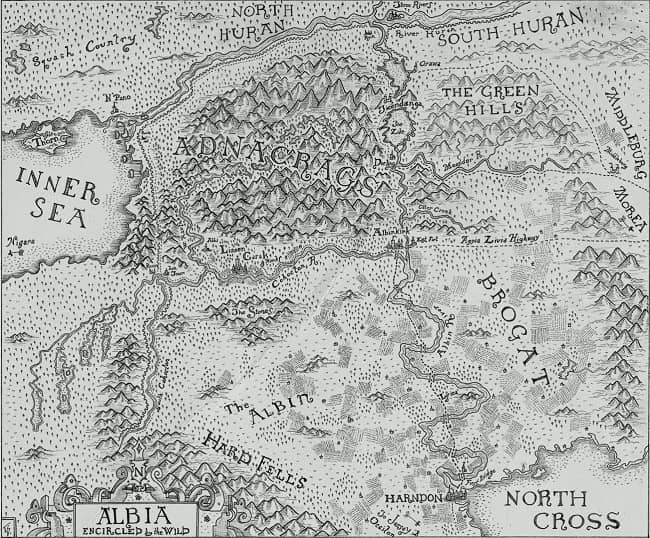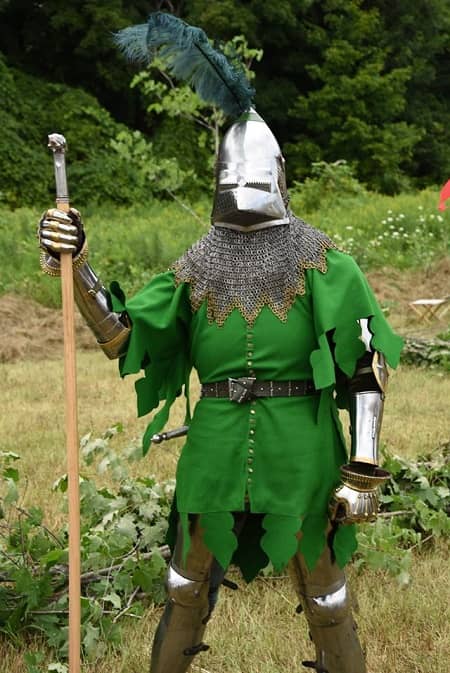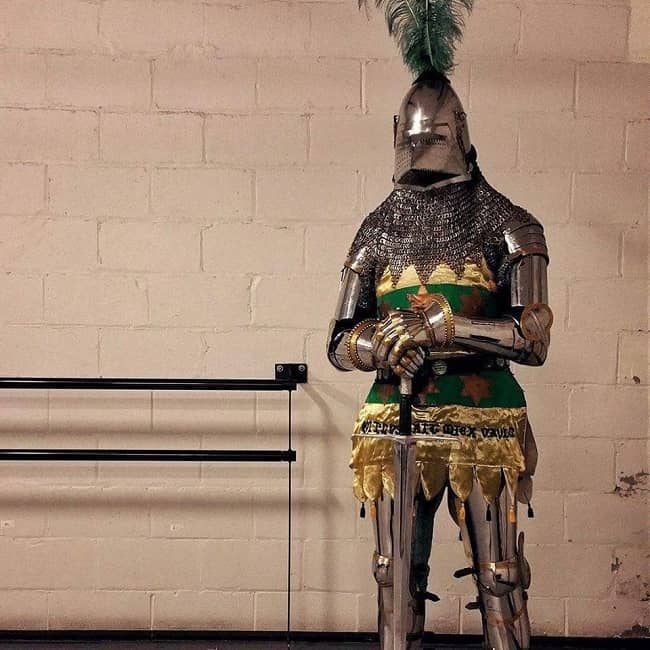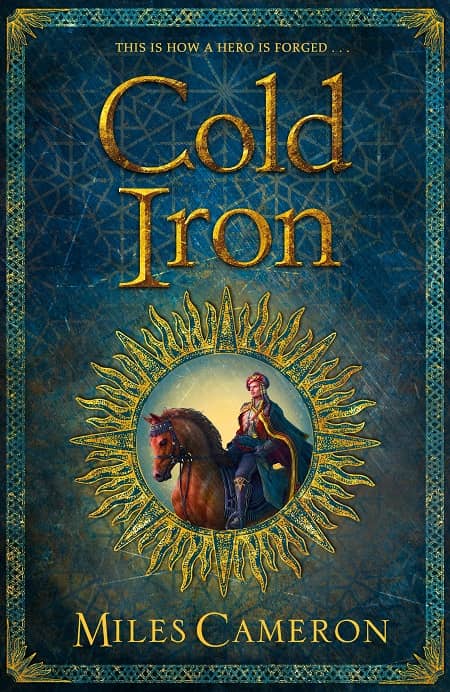Neverwhens: Where History and Fantasy (Careers) Collide — an Interview with Christian (and Miles) Cameron
Christian Cameron as a Hoplite
Christian Cameron, a well-known historical fiction author who writes espionage novels under the pen name Gordon Kent and fantasy under Miles Cameron, is a Canadian novelist who was educated and trained as both an historian and a former career officer in the US Navy. His best-known work is the ongoing historical fiction series Tyrant, set in Classical Greece, which by 2009 had sold over 100,000 copies. But in recent years he’s not only chronicled ancient Greece, but 14th-century European history — military, chivalric, and literary — in England, France, Italy, and Greece and roughly in parallel with the career of Chaucer’s knight (the Chivalry series). And, as Miles Cameron, he also writes fantasy with the Traitor Son tetralogy and Masters & Mages trilogy.
Cameron is a passionate reenactor, and uses the experiences of reenacting, including knowledge of the material culture and the skill sets required to recreate any portion of life in the past as essential tools in writing his novels. Cameron helps organize and direct military and non-military reenactments in the United States, Canada, and Europe. In addition to recreating the life of an early 5th-century BCE Plataean Hoplite, Cameron also runs a group dedicated to the role of rangers and Native Americans in the American Revolution, and participates in tournaments as a knight of the late 14th century. One such tournament is the Deed of Alms, an annual HEMA (Historical European Martial Arts) charity tournament hosted in Toronto to combat homelessness.
GDM: So you’ve had a long and very successful run as an historical fiction writer before adding fantasy to your repertoire. Which genre was your first love?
CC: Fantasy all the way. Except Dumas’ Three Musketeers, which is to me the greatest adventure novel ever written. I had a friend who was seriously in to ‘Old School’ fantasy; Lord Dunsany, Tolkien, E.R. Eddison, Robert E Howard… etc. Amazing stuff.
[Click the images for bigger versions.]
Christian Cameron, still a Hoplite
What drew you to come back to fantasy?
Lots of things. Changes in the genre; Joe Abercrombie and Mark Lawrence and Lois McMaster Bujold (I bet those three aren’t mentioned together often, but in a certain sense, they should be!)
A column like this one is really all about “world-building”, and we talk about that constantly in the realm of SciFi/Fantasy. But historical fiction is a complex process of world-building in its own right. Could you describe your process? I don’t mean “I read a lot,” but I mean, when you set out to write about Classical Greece, 14th-century Italy or 18th-century North America, what are the sorts of things you are looking to weave into your fiction to make the literary world feel “real”?
I’m a reenactor, and I think that what I write, whether fantasy, Sci Fi or historical, is ‘experiential.’ I’ve begun to notice (maybe I’m slow) that I’m not good at ‘long view’ books. I tend to relate day by day, because I want the reader to feel as if they lived it. Because I guess that’s how I see it when I write; like a reenactment.
The Traitor Son sequence is really a marriage of several of your loves: a parallel world that takes a twist on Arthurian themes and sets them in a 14th-century culture, where the lands of “Outremer” seem a lot like colonial America. Byzantium is in Massachusetts and the crusader kingdom of Alba is New York… complete with corn, tobacco and Iroquois! I remember smacking my head when I realized what was going on. Can you tell me a little about what inspired Alba?
Now, to be fair, I think of it as all my favourite parts of the world spot-welded together, right? So Greece is handy, over by New Hampshire… but it’s mainland Greece with archipelagoes extending all the way east to ‘France.’ And then the Adirondacks are co-located with the Lake District in the UK and parts of Highland Scotland are in Vermont. I was really writing a love letter to both history and fantasy and hoping they’d both be friends. Or looked another way, it’s literally set in all the places I’ve reenacted the Middle Ages and it’s a fantasy based on reenacting. Plus bogglins. [ed: The setting’s ‘goblins’. Not-terribly bright roach people who, really aren’t so terrible, if only we didn’t instinctively, well, hate roaches.]
14th-century Europe is someplace you were already visiting in your “Chivalry” series, and many of the cultural themes – from the medieval mercenary system to armizare, the martial art the two heroes (and both of us!) practice — appear in both. Of course, there are also shape-shifting fey folk, a race of intelligent roach-men, talking bears, griffons and some of the most potent dragons I can recall in fiction. So… how did the process of creating Alba differ from, say, creating *your* Venice, c.1370?
My brilliant editor, Gillian Redfern, challenged me to pit humans against the ‘Wild.’ We had some cool conversations and I think she may have expected ‘The Last of the Mohicans in fantasy’ but ended up with Red Knight — Thomas Mallory instead of James Fennimore Cooper, or maybe Mallory with a visitation by Cooper’s ghost. The creation process was deeply organic. I started writing it on a camping trip in the Adnacrags…. Er, the Adirondacks, and then I started adding in bits; I needed Hector’s death scene to be authentic and moving, and I knew where to place it… in Scotland… and then…
Really soon I had to make a map, and here’s where I have to say my friend Steve James is my map maker and often helps me ‘create’ a reality, even in the real world. So once I knew that *this* world was drawing from elements of our world, it was one part feeling the synthesis and then making it plausible. For me, believable maps do that.
I’m a total map-geek, too. But I was thinking beyond Thrake seems like late Byzantium, or the trade post of Osawa seems suspiciously like Ottawa. Fantasy fiction is often even driven by grand themes or very personal ones, but the secondary worlds rarely get into the nitty-gritty of what makes a society work. I can’t recall another fantasy book that managed to explain the ramifications to a kingdom of an interruption of the fur trade, or the devaluing of coins, let alone made it central to one of the main plot streams! I assume these are both real, 14th century problems?
You know, intriguingly (at least for me) my research on Red Knight became entwined with research I’d done for my Rev War reenacting hobby. I knew the fur trade was vital to the Colonial powers, but until Tasha (that’s your wife, Greg) turned me on to a book about the European Medieval fur trade, I’d never put all the pieces together to see how linked the Seven Years War (1755-1763) and the later Middle Ages were, in terms of fur.
So if the New World had been available to Europeans in 1370… Venice would have fought Genoa for the trade… in the Saint Lawrence…
And we’d have our own castles, damn it.
So, how do you make such a very dense, “real world” problem exciting for His Fic readers? For fantasy readers, who are giving their attention to dragons and parallel worlds?
I see problems like that as ‘frames.’ The characters and their interactions, including magic and combat and love lives, those are the ‘picture.’ The macro economics and stuff, that’s the frame, and truth to tell, the reader can, if she wants, just ignore the devaluation of coinage. Who cares? (I do.) But they help with the plot and the world-building.
Christian Cameron as a knight
Now let’s talk Masters & Mages, your second series. This world is a fair deal more of a departure from the Terra Vera we know: a Constantinople-like city in a technological-era long after the historical city fell, variations on some of the more famous fantasy races, mammoths (!!), and some very interesting magic, and magical implications on society. In creating this world, did the historian in you play a complicated series of “what-ifs” to try and make it all fit into what became a decidedly cohesive whole?
Two of my best friends are Greeks. One night in Istanbul, a bunch of us got drunk and fantasized about how the world would be if Constantinople had never fallen in 1454, but then, my Greek friends insisted, Byzantium world still be very close to Turkey; allies, or subjects, and we discussed how that would have been. There was a lot of booze.
I found an interesting nugget in the role of magical contraception….
There’s a scene in one of the Red Knight books too, where the greatest magic user of his generation says, ‘Hey, what would girls like?’ and a bunch of army women say ‘Contraception and clean water.’
I‘ve read some really good feminist histories and I try to think ‘what would magic do if it was available to women? What would women want to make lives better.’ And Masters and Mages is unabashedly Socialist in a Medieval/Renaissance way, not a modern way. Still aristocracies, but an overlay of ideas of equality and magic…
Because if magical ability is innate — you can study it all you want, but you either have a gift or not, and it’s too useful for kingdoms/powers not to use, suddenly, enforced patriarchy gets a little tricky to maintain unilaterally? Or matriarchy, for that matter.
Yup. That’s the sneaky socialist point that sends us away from history as we know it, to history as it might be. Science doesn’t do that, because I can be brilliant, but never given access to a university, but magic…
Yes, but that doesn’t mean those cultures will become our current idea of an egalitarian one.
Not remotely! That’s part of what I mean about “frames” — you take something every culture has, be that trade problems, gender roles, whatever, you tweak them and you change the shape of the frame and then see what the picture will become.
Christian Cameron as a (different) knight
From the point of creating audience “buy in” – now that you have two fantasy trilogies and an ever growing number of historical fiction tales under your belt, what would say is most important in making readers believe and disappear into the world your are presenting? Is there something more (or less!) you’ve found fantasy requires?
Fantasy requires a great deal more background. Most people know, or think they know, ‘how’ Ancient Greece works. (Actually, often they’re dead wrong; the Spartans were nobodies heroes, for example) but when you offer a new world….
Wow, you have a lot to explain. My next foray is the Bronze Age, but a fantasy Bronze Age with amazing insect people and a global weather crisis and gods gone insane. It’s not based on any particular culture…but it’s based on all of the Bronze Age…
Martial arts forms an important part of your fiction as well — both in personal combat and the sweep of the battlefield. You’ve become a known expert in the ever-contentious field of hoplite combat research and, indeed, researching 14th century knightly fighting arts was how we met! People have been arguing the minutia of Greek phalanx warfare for at least the last 120 years, but unless I am following the wrong Academia.edu feeds, there’s not a lot of practical research as to the command structure of pre-modern bogglins or the “dragondoom” effect on cavalry charges. So when you switch from, say the Persian wars of Alexander to the magical battlefields of the Red Knight, do you try to play the same careful “what if” scenarios, or is the answer “it’s magic”?
I’m not a fan of the idea that “It’s magic.” I’m aware that there are sides in this issue, and that there are fantasy readers and writers who are incensed by the idea that there are absolutes to the human experience of this planet (we’ll call that ‘history’) that apply to all cultures you can invent. I’ve been on some very contentious panels on this subject.
So I’m on a side. The side of history. Like you, I can look at a sword and tell you how to use it; or if it can be used at all. I recognize that this sounds arrogant, but it’s really no different from a carpenter looking at a fantasy hammer and saying. ‘Looks neat; won’t drive a nail for crap.’ And the same goes for horseback riding, military logistics, the amount of oats a mule eats in a day, how to do wilderness camping, how you catch a fish on a horsehair line, how long gut strings take to break on a lyre, WHY they didn’t have steel strings for the ancient Kithara and can’t have them in a fantasy universe unless you build the whole edifice of a civilization that can draw steel wire…
And let me tie this to your last column, just as a closer.
Cold Iron, by Miles Cameron
Despite my rant, I’m not a purist. I loved the movie Gladiator, and I didn’t really get twisted in knots about some of the martial arts. I totally agree with your views on the sword fighting in Witcher. It was FINE for what it was. None of them made me gag. I would love to explain the concept of ‘tempo’ just once to a fight director… sometimes I count along with a scene, saying ‘your dead, and again there; oops, dead. Also dead.’ But Witcher really wasn’t bad. He flows, he moves, he had technique, and he’s more than human.
I enjoyed it.
So, take that authenticity !
And I guess it’s worth saying that if a trained swordsman, a true master, went up against an average thug… it wouldn’t be Hollywood. It would take perhaps three seconds. Not the way we usually imagine such fights. Might be fine to see, though; it’s sort of what we’re seeing in Justified.
Finally, I know you keep a lot of projects going at once, and you’ve even tried your hand at Warhammer fiction with Black Library. But as yet, there hasn’t been any historical fantasy? Any chance we might see an alchemical-rich Renaissance, magical Peloponnesian War or some sorcerous Hittites down the road?
Never. The truth is, like you, I know too much about how history works to muck with it. That’s what makes it fun to write Historical Fiction and straight fantasy. But Machiavelli with magic… I’m not sure where I’d start…
Hmmm. But now that you mention it….
